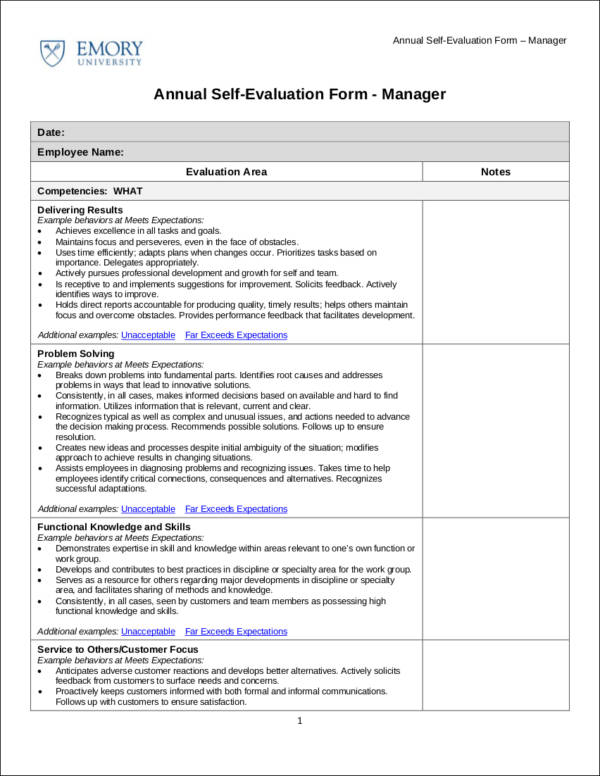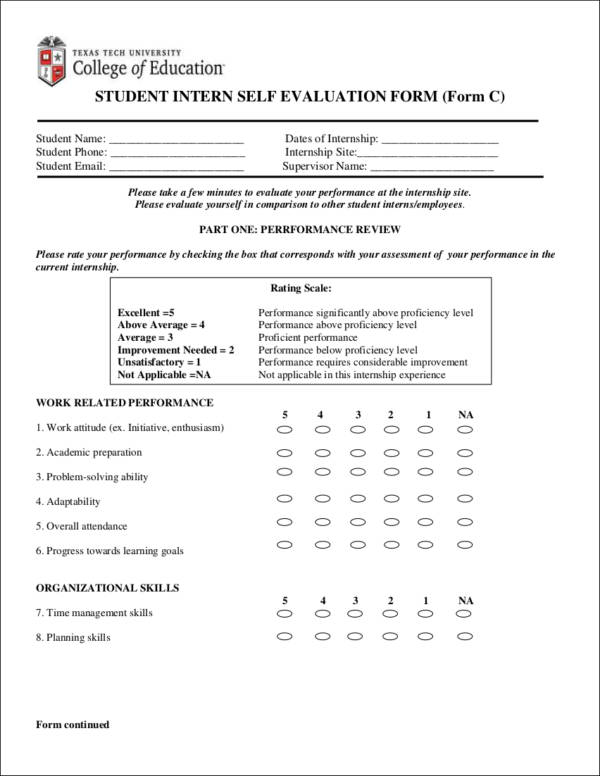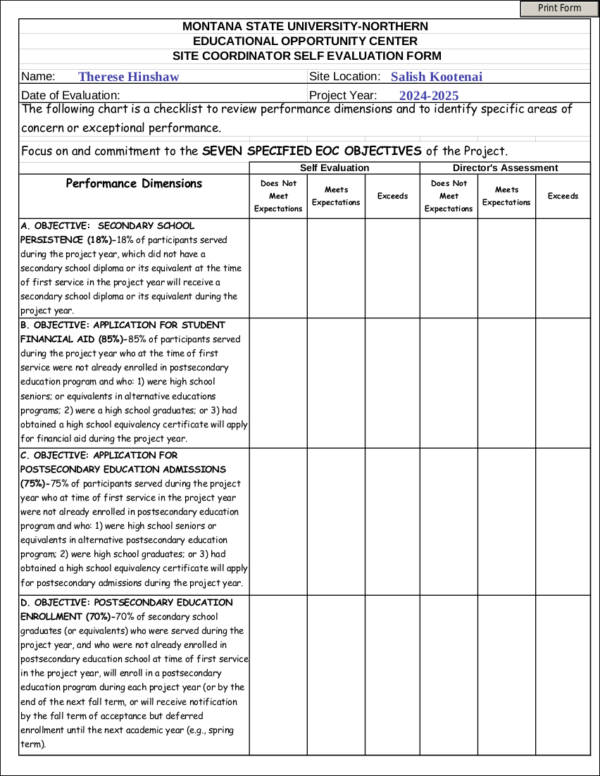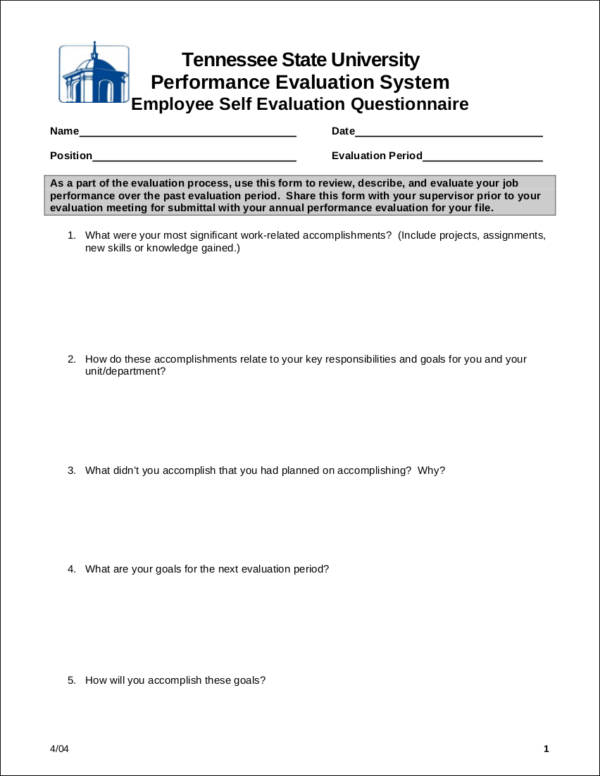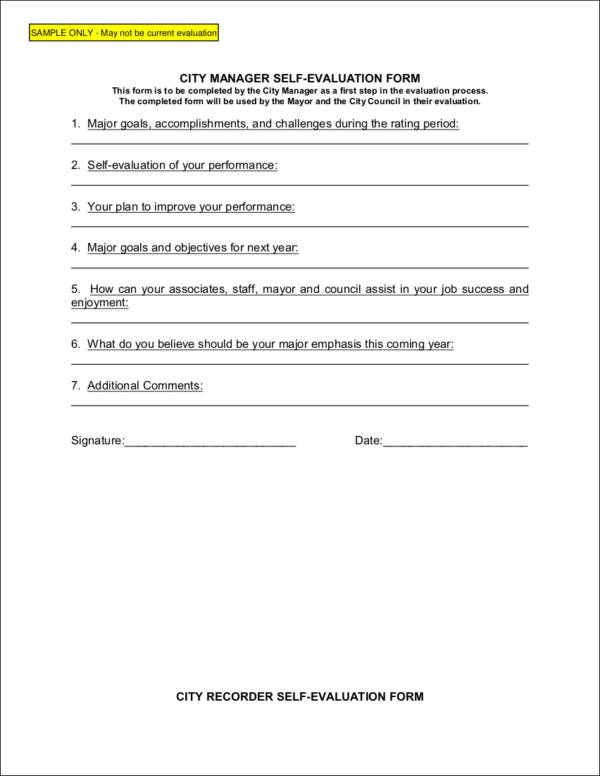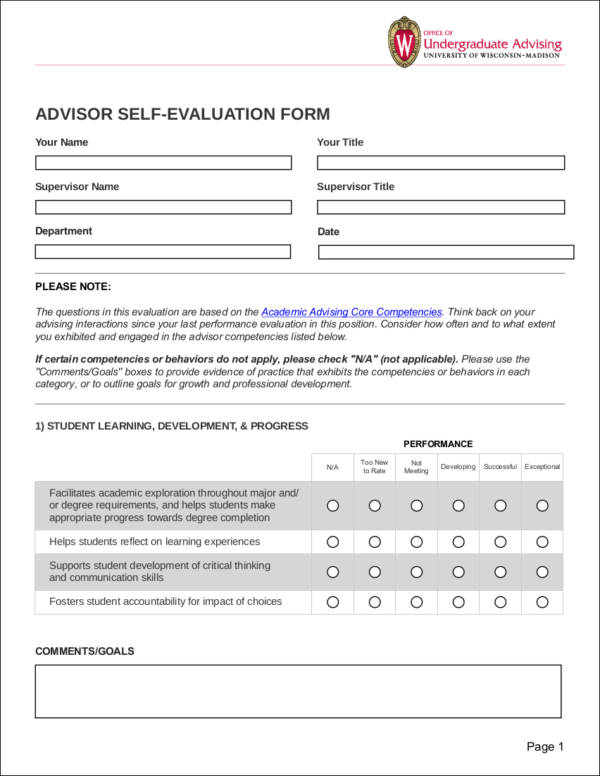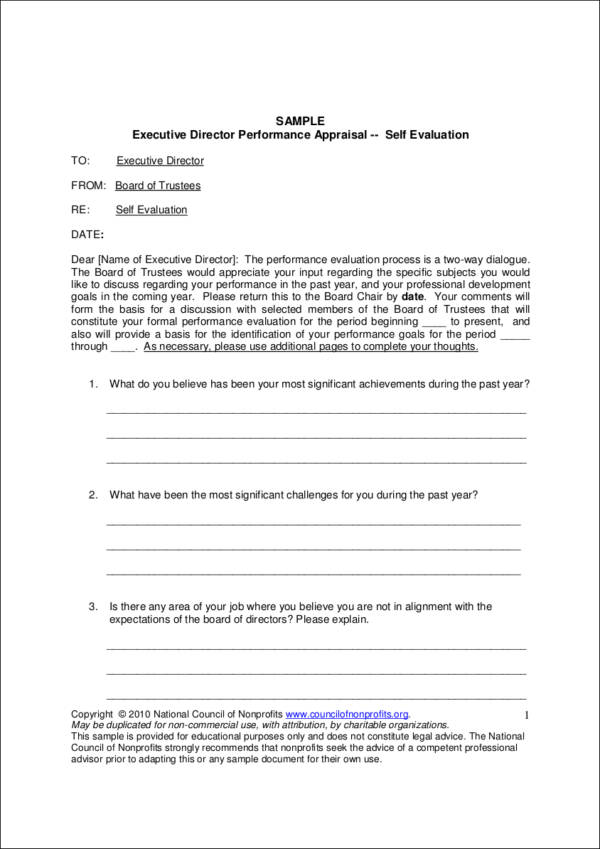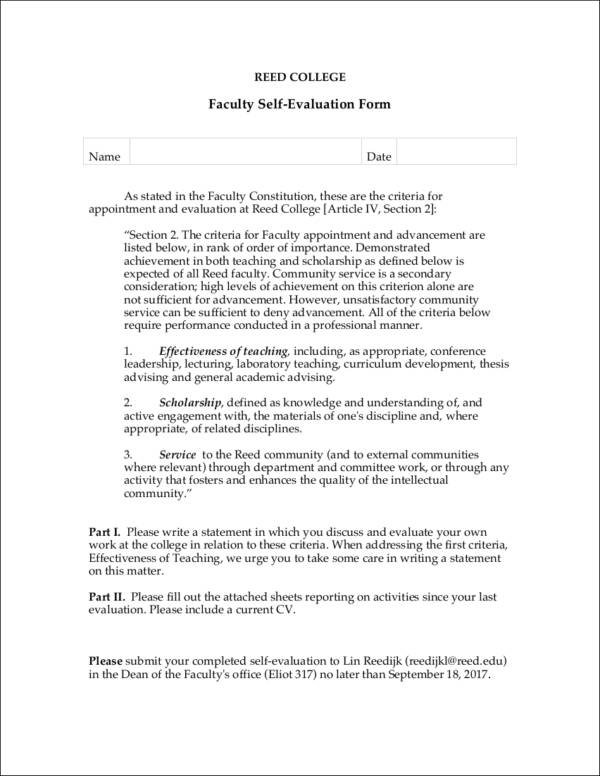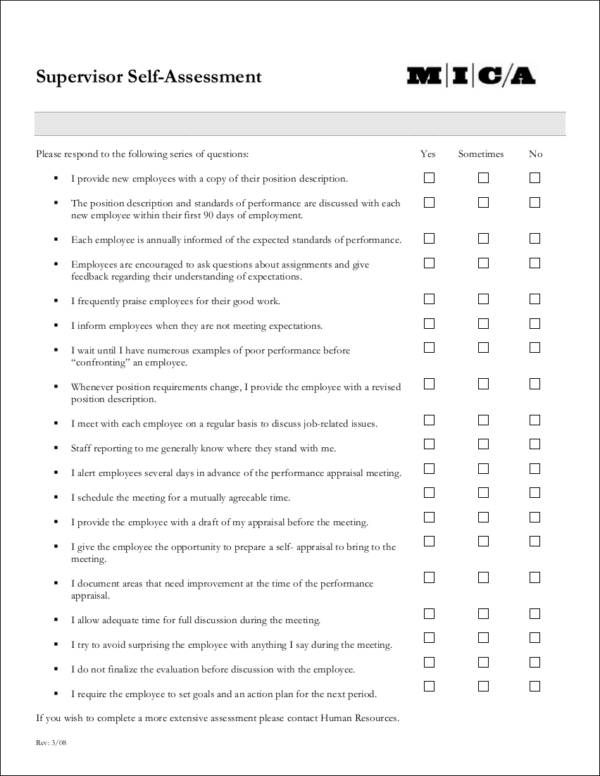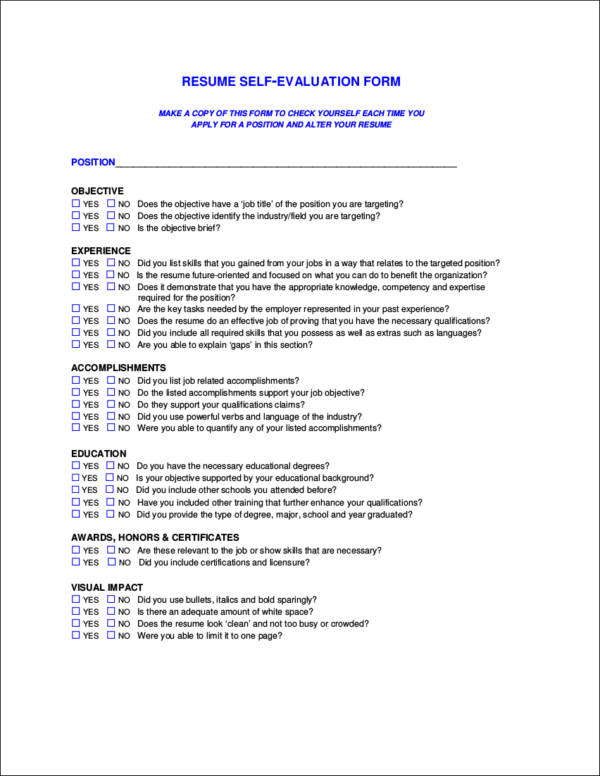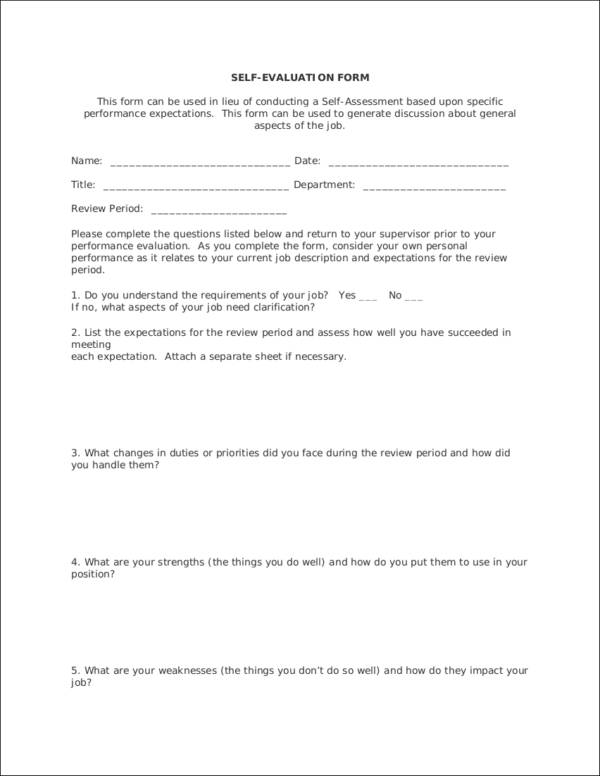Assessing one’s performance, especially in the workplace, is important to be able to improve on certain aspects. How do you effectively assess an individual? You can do this through a self-evaluation form. A self-evaluation form is a tool or document that is used to identify an individual’s strengths and weaknesses as well as his/her contributions to a particular company or an undertaking that the individual is doing. Performing an evaluation helps assure that the individual is doing the best of his/her capabilities by conducting different training and programs to improve areas that will benefit both the individual and the company that he/she is working for.
An evaluation can be done for a variety of purposes, whether it is for personal growth or it is required by the company where that particular individual is employed in. For example, an evaluation can be done by teachers at a particular school or college for the purpose of assessing his/her teaching methods. Through the use of a teacher self-evaluation form, he/she will be able to identify the areas that can be improved to be effective in what he/she does. In this article, you will read about the definition of a self-evaluation, its importance, the steps in creating one, as well as some tips that will be useful in helping you conduct your own self-evaluation. You will also find self-evaluation form samples and templates in this article that you can use to format or outline your document.
Annual Self-Evaluation Form Template
Student Intern Self-Evaluation Form Sample
Site Coordinator Self-Evaluation Form Sample
Employee Self-Evaluation Questionnaire Sample
What Is Self-Evaluation?
A self-evaluation is a process of analyzing, observing, and measuring one’s performance in order to improve or meet a particular standard. A self-evaluation can be done on an individual level or an organizational level. Companies conduct a self-evaluation for their employees as well as for the organization as a whole. Companies and businesses also perform a self-evaluation in order to understand the status of the company’s performance or their market position at a particular period of time. Through this, the company will be able to determine their strengths as well as their weaknesses, which are important in creating the goals and plans of the business or entity.
Why Is It Important to Use a Self-Evaluation?
In order for individuals and organizations to progress, a proper evaluation is essential. To help you further understand the importance of a self-evaluation, here are the reasons why a self-evaluation is important:
- A self-evaluation is important to be able to understand the status of an individual or an organization’s performance.
- Without a self-evaluation, companies will not be able to assess their employees and create methods to improve certain aspects to get the best results that will benefit both parties.
- An organizational self-assessment or evaluation is also important to be able to improve the overall operations of the company or the business.
- Although a company can perform an employee evaluation, an employee self-assessment is important since an employee’s feedback also helps in the overall assessment of the individual.
- A self-evaluation allows individuals to be part of the overall assessment process instead of just being the recipient of feedback from the company they are working in.
- An employee self-evaluation provides managers or other individuals performing the evaluation a better perspective on the employee’s performance since an evaluation is also done based on the individual’s point of view.
- A self-evaluation is also important for students in order for teachers to understand what the student/s have learned at a particular period of time and what exactly needs more improvement. Through this, teachers can also develop new methods to adapt to the student’s learning style.
- In business, a self-evaluation allows both the employer and the employee to discuss and communicate for the purpose of personal growth or to facilitate in helping the employee develop certain aspects of his/her performance.
- Self-evaluations also enable individuals to develop and create personal goals to improve oneself.
- A self-evaluation is also useful in determining whether an individual qualifies for a promotion or a salary increase.
Manager Self-Evaluation Form Template
Advisor Self-Evaluation Form Sample
Sample CEO Self-Evaluation Form
College Faculty Self-Evaluation Form Sample
Steps for Preparing a Self-Evaluation
An effective self-evaluation requires thorough preparation to ensure that you will have useful and accurate results. The steps in preparing for a self-evaluation are as follows:
Step 1: Schedule
When preparing for a self-evaluation, the first step that you should do is to prepare a schedule for the assessment or evaluation that you will be doing. Having a well laid-out schedule ensures that you will have enough time to complete the evaluation process as well as have all the necessary information or data that you will need during the process.
Step 2: Review your goals
As preparation for the self-evaluation that you will be doing, review your set goals. It is important that your self-evaluation meets your personal goals as well as the goals that a particular organization has depending on the purpose of the evaluation that you will be performing or conducting. This will also help you develop goals after you finish your self-evaluation.
Step 3: List down your accomplishments
Now that you have reviewed your goals, list down your accomplishments. Your goals will help you determine or identify your accomplishments during a particular period of time. Base your accomplishments on the work that you have done and use your goals as a reference whether you have met the standards and how well you have completed a task or project.
Step 4: Focus on yourself
Since you are creating a self-evaluation, focus on your accomplishments and contributions as well as your qualities. Unless you are creating an organizational evaluation or a team evaluation, you don’t have to discuss the accomplishments of your team.
4 Dos in Writing Your Self-Evaluation
When writing your self-evaluation, it is important that your best qualities and accomplishments are highlighted in the self-evaluation form that you are creating. This is to ensure that your self-evaluation stands out. The dos in writing an effective self-evaluation are as follows:
- Do remember to include specific results when writing your self-evaluation. It is also useful to support them with qualitative information. Through this, you will be able to show that you have the ability to develop strategies that will meet or exceed your goals or target.
- Do categorize your accomplishments to make it simpler and easier to understand. Your accomplishments should also align with your personal goals as well as the company’s goals. This will help you illustrate that you clearly understand the priorities of the company and that you are contributing to the overall operations of the business.
- Do include in your self-evaluation the various feedback that you have received from your colleagues, business partners, managers, customers, etc. This feedback will display your capabilities in performing and completing various tasks, accomplishing expectations, as well as how well you manage relationships in the workplace.
- Do showcase your skills and strengths when writing a self-evaluation. This will help you differentiate your performance from others, not by what you are tasked to do but by how you perform these tasks.
Supervisor Self-Evaluation Form Template
Resume Self-Evaluation Form Template
Basic Self-Evaluation Form Template
Elements of an Effective Self-Evaluation
Evaluation forms contain important components that are essential to effectively assess an individual’s performance. Here are the elements that an effective self-evaluation should include:
- Competencies – just like any other evaluation, a self-evaluation contains competencies or performance aspects. These competencies refer to the standard set of skills, abilities, and other aspects that are used as a reference when performing a self-evaluation.
- Goals and Planning – goals are essential elements in every self-evaluation. It is important that you review your previous goals as well as create new ones through planning. Planning and creating goals as well as the steps are needed to be done to improve certain aspects of an individual’s performance.
- Rating Scale – a self-evaluation also contains a rating scale. A rating scale is a tool that is used to measure or gauge an individual’s performance whether he/she meets the standards that are set before the evaluation is done. These standards also depend on the business or company where the evaluation is performed. The rating scale typically shows a numbering system wherein 1 symbolizes as a poor performance and a 5 as an excellent performance.
- Strengths and Weaknesses – every self-evaluation should clearly lay out the individual’s strengths and weaknesses. This is an important component in order for the individual to understand the aspects that he/she is strong at and where he/she needs more improvement to be able to meet a particular standard.
Useful Tips for Creating a Self-Evaluation
Creating and filling out a self-evaluation can be quite confusing sometimes, especially when you don’t have the idea on how to go about with the process. To help you in creating one, we have gathered some useful tips that you can refer to. The tips for creating a self-evaluation are as follows:
- Always remember to be realistic when performing a self-evaluation. When evaluating yourself, it is important to do it objectively and ensure that you credit yourself for your accomplishments.
- Provide specific information or data in your self-evaluation. When talking about your accomplishments, contributions, or strengths, it is important to back it up with examples or information that will support your statement.
- Always remember to be honest when writing a self-evaluation. Ensure that your statements are true and avoid taking credit for accomplishments that you have not earned.
- Clearly state the goals that you want to achieve after you have performed the self-evaluation. State your personal plans for improvement as well as the steps that you want to take to achieve these goals.
- Be constructive with any feedback that you provide in your self-assessment. Since a self-evaluation can also contain your personal feedback of the company or business, ensure that the statements you provide are constructive.
Furthermore, if you need other templates and samples such as a meeting evaluation form, training evaluation form, and other types of evaluation forms, you can download from all the available evaluation forms available on this site.
Related Posts
Sample Sworn Affidavit Forms
Vehicle Inspection Forms Samples & Templates
Sample Employee Advance Forms
Sample Child Travel Consent Forms
Sample Testimonial Request Forms
Sample Employee Details Forms
Sample Divorce Forms
Sample Attestation Forms
Employee Performance Appraisal Form Templates
FREE 9+ Sample Presentation Evaluation Forms in MS Word
FREE 10+ School Admission Form Samples & Templates in MS Word | PDF
FREE 30+ Patient Consent Form Samples in PDF | MS Word
FREE 10+ Sample Sign Off Form Templates in PDF | MS Word
FREE 11+ Sample Medical Consultation Forms in PDF | MS Word
FREE 8+ Sample Donation Forms in PDF | MS Word

